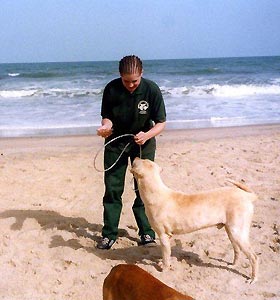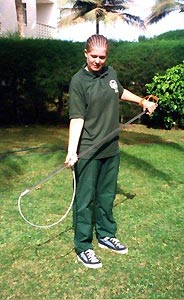DOG HANDLING EQUIPMENT
Capture, transport and holding of dogs should be done humanely.
Capture should be achieved with the minimum force required and equipment should be used that supports humane handling.
Appropriate training should be achieved before trapping dogs.
Slip leads and snares
To catch a dog that is not aggressive or nervous about being handled around its neck, slip-leads and snares can be used, as in the photos below. This works best if the dog knows the handler.

Dog traps and nets
To catch an aggressive or frightened dog, traps and nets can be used.
Dog traps are expensive and bulky. They are especially useful for catching small to medium sized dogs. Ideally traps should be covered to make the dog feel safe.
Catching dogs with nets is an art. The advantage is that a dog can be fully restrained within a net and then lifted up without having any constraints around its neck. Training is needed before using nets.
In all cases the aim is to minimise stress to the dogs during the catching/trapping process.
Dog graspers and poles
Dog poles are for restraining, not for catching and can easily be used incorrectly.
They can cause significant stress and injury to dogs when not used responsibly and the handler needs to have had in depth training when using these.
Dog poles are not suitable in dogs that aren’t used to collars or being handled around the neck. A dog’s reaction to feeling force around its neck is to panic and move away from it, this can result in the wire loop overtightening around the neck and can even cause death. For this reason, dog poles should only be used within a confined space, e.g. kennel area, so the dog is prevented from trying to move away from the pole.
Uncovered wire loops should never be used as they can cut into the dog’s skin.

Gloves, gauntlets and muzzles
These can be used to avoid the risk of being bitten.

All these types of equipment are described in the web site of MDC Exports
Please contact SNIP International if you would like further advice
HOW WE CAN HELP YOU
Advice
SNIP International was founded in 1996, and ever since, we have accumulated our knowledge base on animal welfare and on TNR. The small but dedicated team of SNIPi volunteer trustees are all experts in their fields, willing to transmit their knowledge for the benefit of animals.
We have gathered a lot of practical advice in our FAQ section, with links to sources of further information. If needed, you can contact us for non-urgent advice, and the SNIPi team members will reply to you within their possibilities (time constraints).
Connections
Having worked with animal welfare groups all over the world for a long time, we know many of them. Please check FAQ / Useful links and if necessary, contact us by email.
TNR Grants
Between 1996 and 2024, SNIP International distributed over 2,300 pieces of equipment to 96 countries, benefiting 681 animal welfare groups worldwide.
SNIP International is no longer donating equipment but is now giving out monetary grants to animal welfare organisations to help them in their TNR efforts outside the United Kingdom. Animal welfare organisations can apply for grants worth £ 2,000 each. The next application deadline is 30 September 2025.
For more information, please visit our grant page


